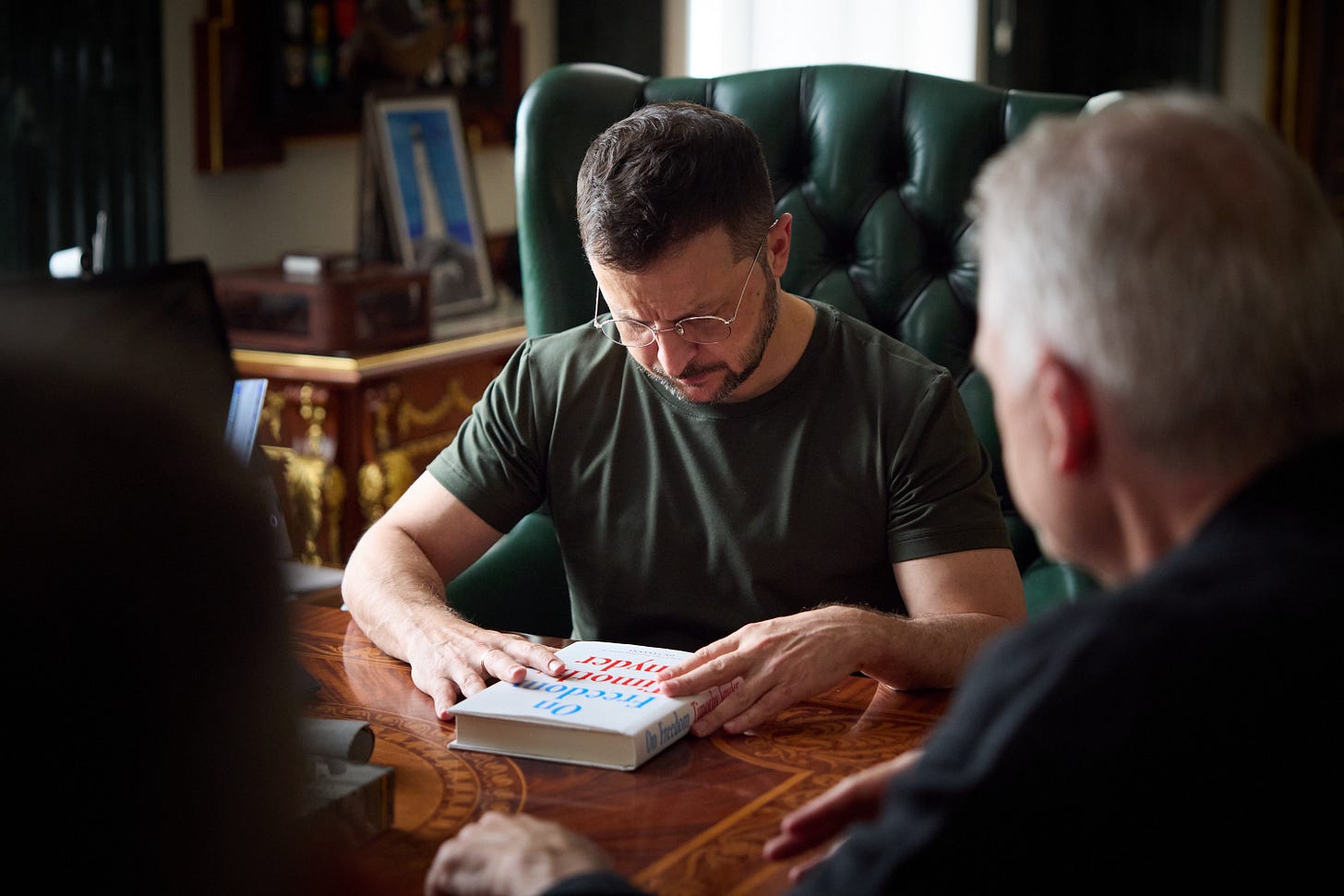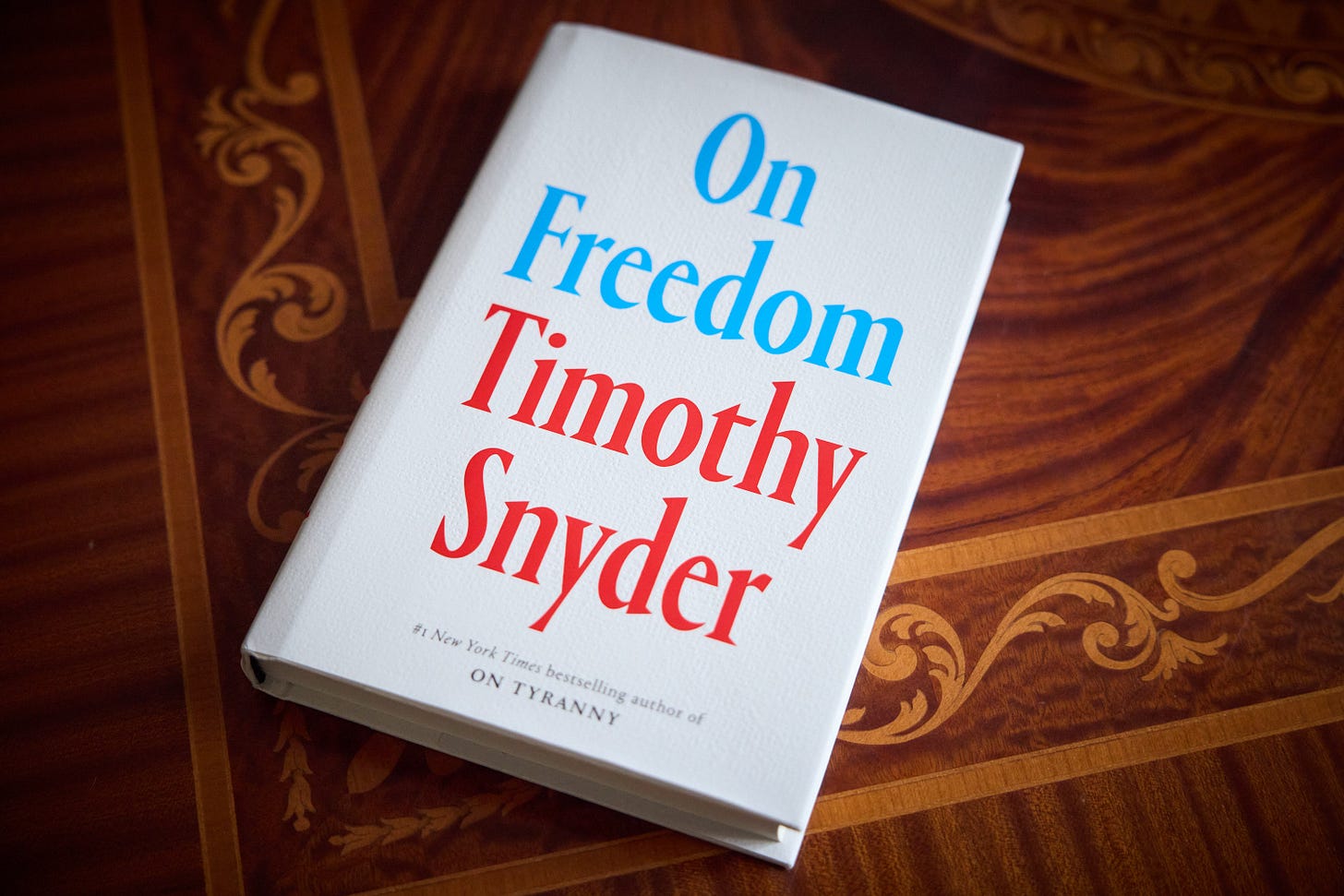Talking freedom in Kyiv
Two years ago and today
We think that freedom is about talking. But it is just as much about listening. If we can’t listen, we are trapped in our own story. I’ve spent the last five years trying to think through the definition and politics of freedom, and the resulting book has just appeared. I could never have done it without all the conversations, including one with the president of Ukraine.
Two years ago, in September 2022, I went to see Volodymyr Zelens’kyi for the first time. Russia’s full-scale invasion began that February, and the Ukrainian president had chosen to stay in the country, although Russia had sent assassins to kill him and Americans had expected that he would run. It was a confusing drive through the city followed by a maze of barriers and sandbags to be cleared on foot. I had a few things I wanted to make sure he knew, but it was all familiar to him already. So he looked at me and asked: “What do you want to talk about?”
Over the years I have spoken to a number of heads of government and state, and, much as the conversations were often warm and friendly, none of them had ever asked me such a generous question. The circumstances made it more remarkable. Ukraine’s first major counter-offensive was underway. Ukrainian soldiers had just deoccupied much of Kharkiv region in a lightening operation. Many leaders would have taken at least a moment to make sure that such a stunning achievement was somewhere near the beginning of the conversation. Zelens’kyi did not feel the need to speak about it at all.
“I want to talk about the philosophy of freedom!” That was my response and it was the truth. I was in the middle of my book about the definition and politics of freedom, and I had asked for the meeting for this reason alone. I wanted to know what Ukrainians meant when they spoke of freedom, as they so often did and do. The meeting with him was one of dozens of conversations in the country where I was trying to figure this out. I wanted to hear the president explain why he had chosen to remain in the country, when the world had anticipated immediate Ukrainian defeat.
Zelens’kyi spread his hands in a gesture of welcome, and responded: “Let’s talk about that!” We ended up speaking for most of the afternoon, in Ukrainian, about subjects that interested us both. I wanted to review my philosophical references with him, and there was some overlap, especially in the dissident literature of the 1970s and 1980s. What he had studied, though, was not philosophy but theater, and his view was that “everything is in Shakespeare.” I can see it. Listening to him helped me to clarify basic ideas that figure in the book.
One is what I think of as the Zelens’kyi paradox: a free person can sometimes only do one thing. If we think of freedom as just our momentary impulses, then we can always try to run. But if we think of freedom as the state in which we can make our own moral choices and thereby create our own character, we might reach a point where, given who we have chosen to become, we have only one real choice. That was how Zelens’kyi described his decision to stay in Kyiv: as not really a decision, but as the only thing he could have done and still remained true to himself. It was not only about defending freedom, although of course it was, but about remaining a free person.
Another has to do with freedom of speech. The notion of “free speech” has become very inflated, used all too often just to mean the right to offend someone or cause disruption by knowingly telling lies, often from a place of power and wealth. The reason why we care about freedom of speech, though, is that we want to protect the dignity of the individual and protect the individual from the powers that be. Freedom of speech is protected so that we can speak our truths to power, not so that power can force its lies on us. It must be a right, in other words, because truth is risky. When Zelens’kyi stayed in Kyiv, he posted a selfie video with colleagues in which he assured people that “the president is here.” This was an expression of freedom of speech, in the deeper, correct sense. He was taking a risk: the assassins were looking for him, Russian troops were close to Kyiv, and the city was being bombed. And he was telling the truth. And the risk was the truth, and the truth was the risk.
A couple of other big ideas in On Freedom relate to that conversation, which was chiefly about other people we admired. “You don’t really have thoughts, other people think through you.” That was Zelenskyi’s own radical formulation two years ago, when we were talking about the books and the teachers that had mattered to us. I saw him again last week, and was able to give him his copy of the book. It was the first one I had, straight from the printer, which I put right in my suitcase when it arrived. When I gave it to him, I felt like a circle had closed, and there was a moment of silence as he looked at the dedication. And then I asked him: “What do you want to talk about?”




My dream is that we all survive for enough years to watch an online event, "Volodymyr Zelensky and Timothy Snyder discuss Shakespeare".
How appropriate that your first copy of "On Freedom" went to Zelensky! I second Angela's comment, "Thank you for all you do." Your voice is one of my lifelines in this treacherous time.